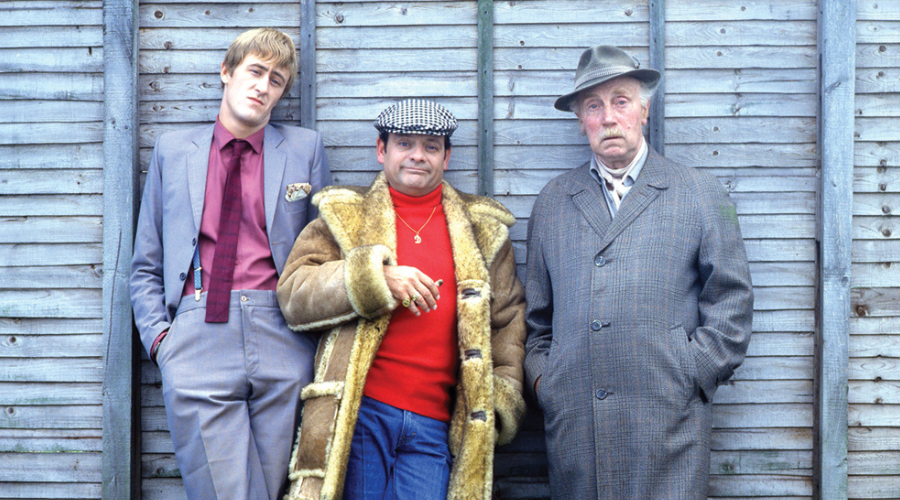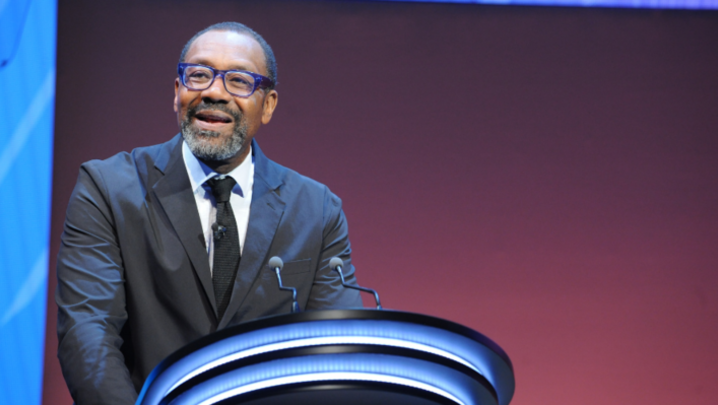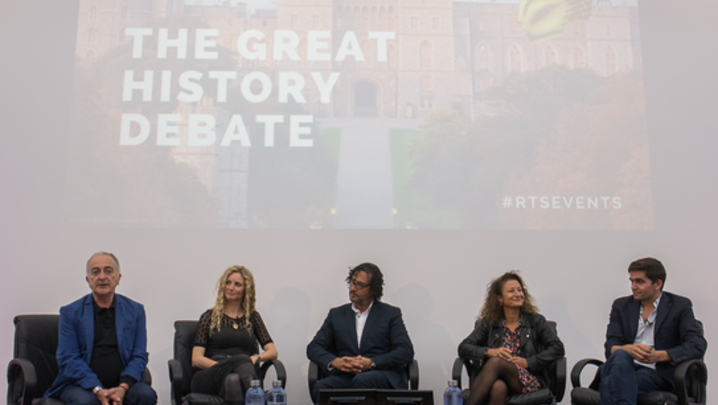If the UK’s booming classic TV channels were to share a theme tune, it would surely be Kylie Minogue’s ‘Better the Devil You Know’.
“People like familiarity and ITV3 is a very safe environment,” says John Williams, Head of Scheduling Strategy, ITV1, ITV3 and ITV4. “The evergreen dramas are nice and soft; Vera, Endeavour, Midsomer Murders are what the channel is – those are the pillars of the schedule. On ITV3, we do not do explosions or gruesome murders.”
The numbers do not lie: drama specialist ITV3 has been the UK’s number-one digital channel for the past decade, reaching almost 15 million viewers in January. And more nostalgia channels are entering the fray – Rewind TV began broadcasting on Sky late last month, offering vintage comedy (Drop the Dead Donkey), drama (Department S) and documentaries (Whicker’s World).
“[Gold] definitely has a comfort blanket element to it,” says Gerald Casey, Channel Director of the UKTV comedy pay channel. “During Covid, Gold’s performance was incredibly strong – people were scared, and nostalgic comedy is like a hug.
“Choice is overwhelming, especially in the VoD world and, for older viewers… with classic TV you know exactly what you’re going to get – familiarity, a guarantee of quality.”
Casey points to a vacuum in mainstream comedy, which his channel is happy to fill: “You need to make enough shows to factor in failure and build a consistent pipeline of hits. Ghosts really cut through – but compare that with the 1990s and the sheer volume of shows then.”
Classic comedy is the bedrock of Gold’s schedules. “The shows that were the big hitters of their time are most often the big hitters today – Only Fools and Horses, The Vicar of Dibley, Porridge, Blackadder, Last of the Summer Wine,” he says.
Even comedies below the top level can rise to the top. Last year, Gold resuscitated Ben Elton’s mid-1990s cop sitcom The Thin Blue Line, starring Rowan Atkinson. “Because it hadn’t been on the channel for years, it flew – its performance was as good as any of those big classic shows,” says Casey.
Gold also delves deeper into TV’s vaults. Mid-1970s ITV sitcom The Fosters – relocated from the US to a south London tower block – was the first British sitcom to feature an entirely black cast. It included Norman Beaton and, in his first regular acting role, Lenny Henry. “There is historical value there – someone’s got to be showing that; it’s a really important piece… and it’s still really good,” says Casey.
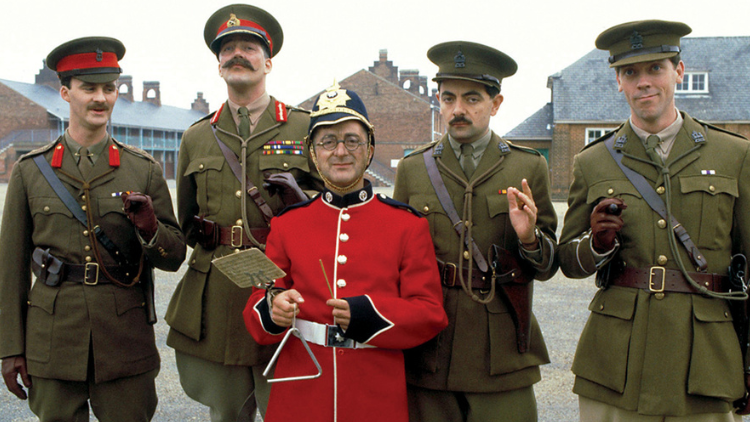
Atkinson and Hugh Laurie in Blackadder
(credit: BBC/UKTV Gold)
So-called nostalgia channels, however, can’t rest on their laurels. Casey’s UKTV colleague Emma Ayech, Channel Director of Drama, says her biggest audiences are generated by “the new stuff – we’ve rinsed all the really good archive and had our maximum numbers for it. Inspector George Gently used to be huge for us but now the big numbers come from [originals], such as The Marlow Murder Club.”
The Home Counties sleuther drew more than 2.5 million viewers in its opening month, and fits the drama template perfectly. As do the Sister Boniface Mysteries, which Ayech says are “gentleness personified – a moped-riding, crime-solving nun in a 1960s village…. There are crimes, people die, but it’s never going to be too awful.”
UKTV has ordered a reboot of the 1980s Jersey-set drama Bergerac. It hopes that, like Channel 5’s new version of All Creatures Great and Small, the series will encourage viewers to rewatch the much-loved original as well as the new version.
“It’s a virtuous circle,” says Ayech. “We’re always trying to freshen up [drama] and give people new reasons to come in.”
ITV’s Williams agrees: “[We] need to keep evolving. We’ve just injected Shetland into the schedule on Friday nights... ITV3 is a well-oiled machine… but, every so often, we have to bring in a new title.”
Unlike UKTV Drama, ITV3 has no plans to commission original series. But Williams points out that current ITV1 Sunday-night hits, such as Grace and McDonald and Dodds, will enjoy “their main life” on ITV3. It can be a seamless transition from current to nostalgia telly.
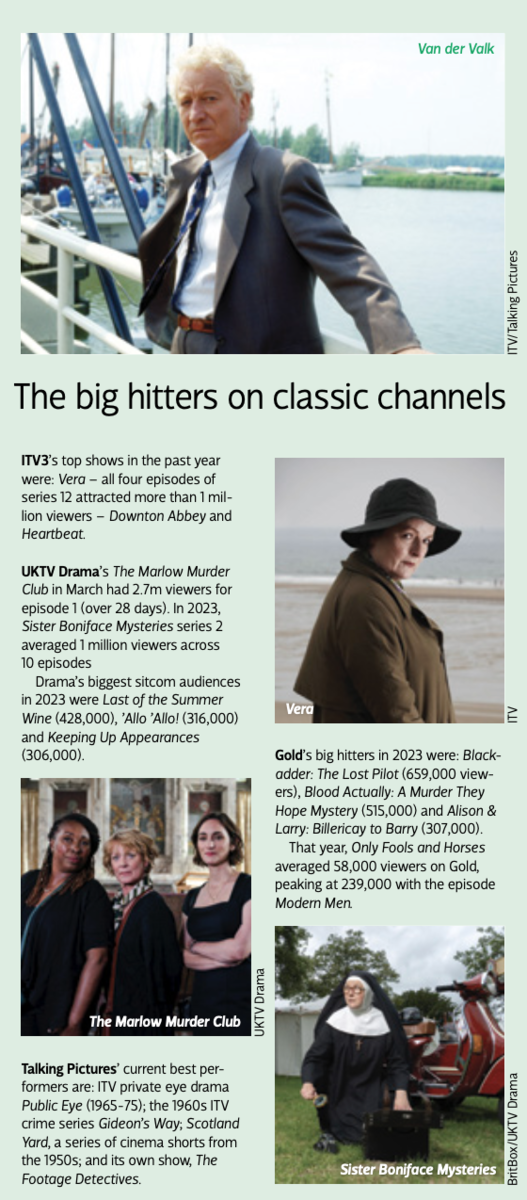
The two ITV channels maximise audiences; when younger viewers are tuning in to three weeks of prime-time Celebrity Big Brother on ITV1, ITV3 offers a week of Vera or Midsomer Murders for the oldies.
“We’re keeping [viewers] within the [ITV] portfolio,” explains Williams. “If we were doing this interview in five, 10 years’ time, hopefully, we [would be scheduling] McDonald and Dodds up against Love Island series 29, or whatever it is.”
How vintage do the channels go? “We don’t have a definitive cut-off date; as long as it’s good quality, remembered and loved, then we’ll go back a long way,” says Ayech at UKTV. “[But] there’s a point, especially with some of the sitcoms we show, where [they] start looking ropey. We have shown black-and-white Steptoe and Son but…we’ve decided not to do it again because it looks so old.”
Gold’s oldest show is generally Dad’s Army, although it has colourised two episodes of Hancock’s Half Hour – ‘Twelve Angry Men’ from 1959 and ‘The Blood Donor’ from 1961.
“Picture quality [matters] and we’re not going to go back to black and white. It needs to be more modern than archive from the 1960s,” adds Williams.
This is where Talking Pictures TV – which broadcasts on Freeview 24 hours a day and celebrates its 10th birthday next year – comes into its own. It’s a family affair – run by ex-film editor and distributor Noel Cronin, daughter Sarah and her husband, Neill. Operating from a garden office in Hertfordshire, the vintage channel offers an eclectic mix of largely British television series and films from the 1930s to the 1990s.
On the day that I chat to Cronin, Talking Pictures is showing Crown Court, Danger UXB, The Brothers and the original Van der Valk from the 1970s, starring Barry Foster. Films include 1951’s school drama The Browning Version.
“I recognised a niche in the market for the older demographic,” he says. “The stations were concentrating on a much younger audience. My view was that they were missing a trick.”
The age of the content, though, is immaterial. “I take the view that, no matter the year, if it’s good, it’s good; if it’s bad, it’s bad. I still love the 1930s films, but we don’t get a big audience for them, so I have to use them sparingly.”
Talking Pictures received a huge boost during Covid, when audiences were literally captive, and it has prospered since; currently, it has “a million or so visits a day”, says Cronin. “Without sounding boastful, we are unique.”
Initially, Talking Pictures was primarily a film channel, but TV, which has more accessible libraries, is now close to parity. Series are overwhelmingly from the 1960s and 1970s; Cronin would love to show more older shows but they “simply don’t exist any more – [thanks to] the wiping of tapes…
“I don’t think anyone realised that [TV] library content would become so valuable.”
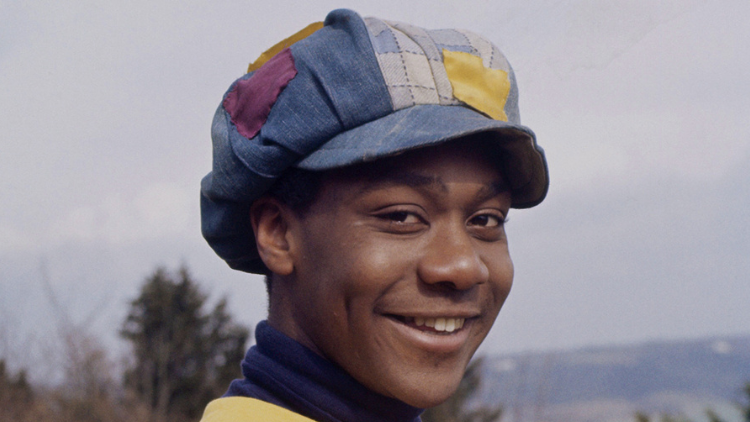
Targeting more recent series brings Talking Pictures into competition with ITV3 and UKTV. “If there’s something that looks good, we’re not going to get it,” he concedes.
Talking Pictures is a shoestring operation, run on a love of all things vintage. Arguably, it’s the country’s best TV museum, but it has to survive commercially. “We have to be very cute with our shopping and dig around for the best value,” says Cronin, adding: “We negotiate a licence with whoever has the rights – nothing’s for free.”
The good news for vintage TV fans is that the supply is almost inexhaustible. This month, Talking Pictures is offering Adam West-era Batman, one of the 1960s campest shows, containing the archest of dialogue.
During the Euros, Drama will be showing the fabulously trashy Footballers’ Wives and Gold is bringing back the almost-forgotten 1980s Nigel Havers sitcom Don’t Wait Up for the summer.
“There are these gems still out there. I refuse to believe that there aren’t – we’ll keep finding them,” says Casey.

